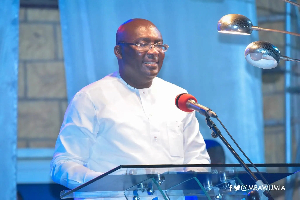Bids placed at the latest forward foreign exchange auction conducted by the Bank of Ghana have indicated that banks and their clients in Ghana expect the cedi to remain relatively stable against the United States dollar until the end of November.
However no-one seems ready to bet on where exchange rates will go in December, possibly out of uncertainty as to the economic effects of the impending general elections.
The results of the latest forward auction, conducted on Tuesday, suggest confidence amongst forex users and their banks that despite the debilitating effects of COVID 19 on both public finances and economic growth, the cedi will hold its own against the dollar.
Forex bids for delivery of dollars in 60 days – that is end of November – quoted a dollar at GHc5.7600, which is just one.per cent higher than the GHc5.7029 at which a dollar was trading on the interbank market as at Tuesday, September 22.
Worryingly however there were no bids for delivery of dollars in 75 days time – which would be around mid-December which means no one is willing to place a bet on the exchange rate by that time. With elections due to be held around the start of that month, forex analysts are attributing this primarily to uncertainties surrounding the outcome and fallout of the elections with regards to the direction of economic policy, and possibly worries over the conduct of the election as well.
Most importantly however bankers are interpreting the results of the latest forex forward auction as a vote of confidence in the central bank’s forex management in particular and macroeconomic management on a wider scale. Customarily, the cedi depreciates significantly towards the end of the year, a phenomenon that is particularly intense in election years.
Instructively, the cedi’s depreciation has slowed substantially in recent months. While it suffered year to date depreciation of 3.7 per cent between January and June this year, it has only fallen by about 0.6.per cent over the subsequent 13 weeks. However, these interbank rates can be misleading; forex bureau rates, which most small businesses and individuals have to rely on are generally about 20 pesewas to the dollar higher.
The cedi’s strength derives largely from the unusually large Gross International Reserves buffer at Ghana’s disposal for most of this year – in excess of US$8 billion, enough for over four months import cover – and even though it has been drawn down somewhat recently, it is scheduled to receive a major boost in the form of this year’s edition of the annual syndicated loan for local cocoa purchases which is expected to provide some US$1.3 billion in forex inflows over the next few weeks.
Furthermore the local currency has also received an unforeseen boost from the dampening of foreign trade volumes due to global pandemic instigated international supply chain disruptions, especially those between Ghana and China where COVID 19 originated from.
Cumulatively, US$63.50 million was bid for at this week’s auction but the BoG only accepted US$25 million. More than half of the amount bid for – US$13.5 million- was for delivery in seven days. The rest was for delivery in 15, 30, 45 and 60 days time
Business News of Monday, 28 September 2020
Source: goldstreetbusiness.com
Exchange rate stability expected until November
Entertainment
















